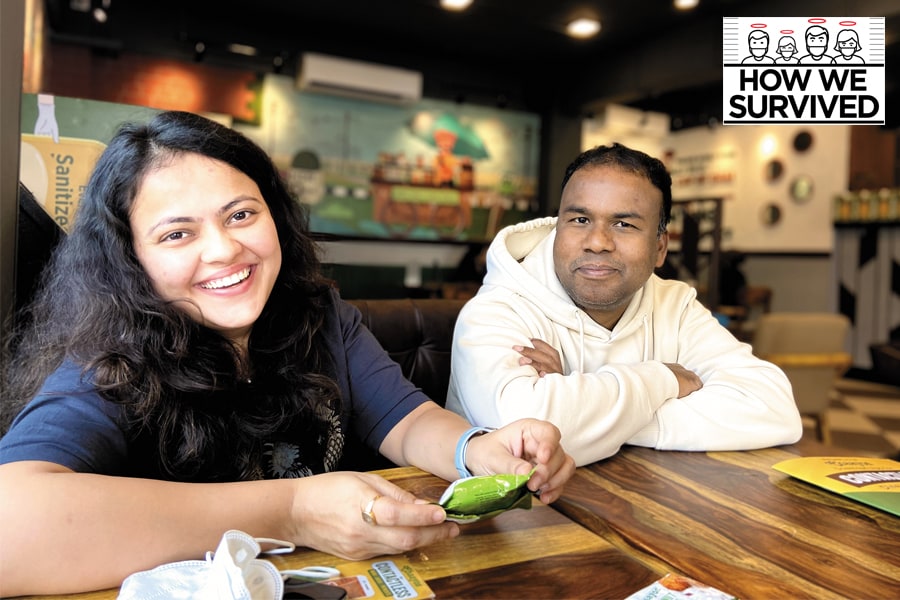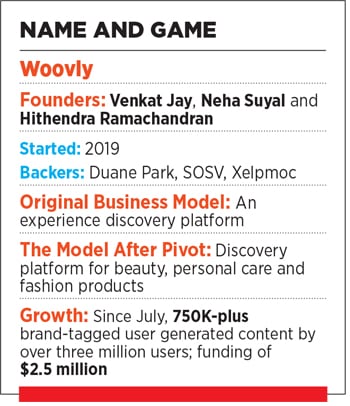
Woovly 2.0: When survival is key
From an experiential travel website to a social commerce platform, this startup redefined its business model during the pandemic
 Venkat Jay and Neha Suyal, co-founders of Woovly. The startup that made the pivot in July curates photos/videos of clothing ensembles for users based on their brand choices
Venkat Jay and Neha Suyal, co-founders of Woovly. The startup that made the pivot in July curates photos/videos of clothing ensembles for users based on their brand choices
'How We Survived' is a series of stories on businesses—big and small—that innovated or pivoted during the coronavirus crisis to survive. For all the stories in this series, click here
The year gone by was nothing less than a roller-coaster for businesses, especially early-stage startups. The pandemic brought along a number of barriers to operations. Many sectors like tourism, hospitality, automobile, education etc were adversely affected, making several business models redundant. It was under these circumstances that businesses had to rethink their offering. Woovly is one such startup that successfully pivoted from being a travel-based bucket list curation website to a social commerce platform focusing on fashion, beauty, skin care, and more.
Started in February 2019, Woovly was an adventure experience-platform where one could create a bucket list and form communities of people with similar interests. The startup had built a customer base of more than two million. In the wake of the pandemic, the platform revamped its format to social commerce that helps users shop instantly via artificial intelligence (AI)-driven brand-tagged user-generated content.
 “Prior to the pandemic, our efforts were focussed on serving the underserved community of adventure service providers. However, when the country first went under lockdown in March 2020, survival became our utmost priority. Redefining the business model to shift to a new sector was a crucial decision, especially for an early-stage startup like ours,” says Venkat Jay, co-founder and CEO, Woovly.
“Prior to the pandemic, our efforts were focussed on serving the underserved community of adventure service providers. However, when the country first went under lockdown in March 2020, survival became our utmost priority. Redefining the business model to shift to a new sector was a crucial decision, especially for an early-stage startup like ours,” says Venkat Jay, co-founder and CEO, Woovly.
Social commerce platforms offer greater interactivity between the buyer and seller as opposed to traditional ecommerce where buyers choose from a set digital catalogue. According to a report by RedSeer, the format is poised to touch up to $7 billion (around Rs 51,703 crore) in India by 2025 as the number of online shoppers—especially from Tier II cities and beyond—continues to rise. “Today buying decisions are largely dependent on social recommendations. While ecommerce is already doing its best, the need for social commerce will rise in 2021,” says Neha Suyal, co-founder, Woovly.
The platform that made the pivot in July curates photos/videos of clothing ensembles for users based on their brand choices. Users can also upload their photos/videos and tag brands, which in turn earns them points that they can redeem later. Over the last seven months, the brand claims to have registered over three million users who have curated and endorsed more than 7,50,000 brand-tagged content. “With the complete makeover, our initial investments had to be written off,” says Suyal.
Woovly raised $2.5 million in a pre-Series A round from venture capital firm SOSV after the pivot. “The funding will be invested in building an even better offering using AI technology,” says Suyal. The startup plans to use AI to allow users to auto-tag brands on the app while they upload content to help improve recommendations for them. Woovly also plans to enable the live-videos feature on its website along with the introduction of a series of ‘Lifestyle Videos’ by industry experts.
(This story appears in the 30 November, -0001 issue of Forbes India. To visit our Archives, click here.)
_20220316022208_102x77.jpg)




